(Web version in English, French, German, Hindi, Italian, Polish, Portuguese & Spanish!)
 Earth Uprising activists protest a new motorway in France. The French state tried and failed to outlaw the group last year - one of many protest victories in 2023.
Earth Uprising activists protest a new motorway in France. The French state tried and failed to outlaw the group last year - one of many protest victories in 2023.
This issue: XR Argentina Uncertain Future | Green Rivers in Italy | 2023 Victories |
Dear rebel,
In 2023, we saw the world get battered by extreme weather, we saw global heating break all records, we saw an oil company host COP and hail vague promises as progress, we saw the West rollback on climate pledges while giving a nod to genocide in Palestine, and we saw billionaires build bunkers in preparation for societal collapse.
As we gear up for another year of protest, we could probably all do with a bit more hope. Which is why you should keep reading. Because as well as covering December’s most inspiring rebel actions from around the world, this issue also remembers some key victories by rebels and their allies over the last year.
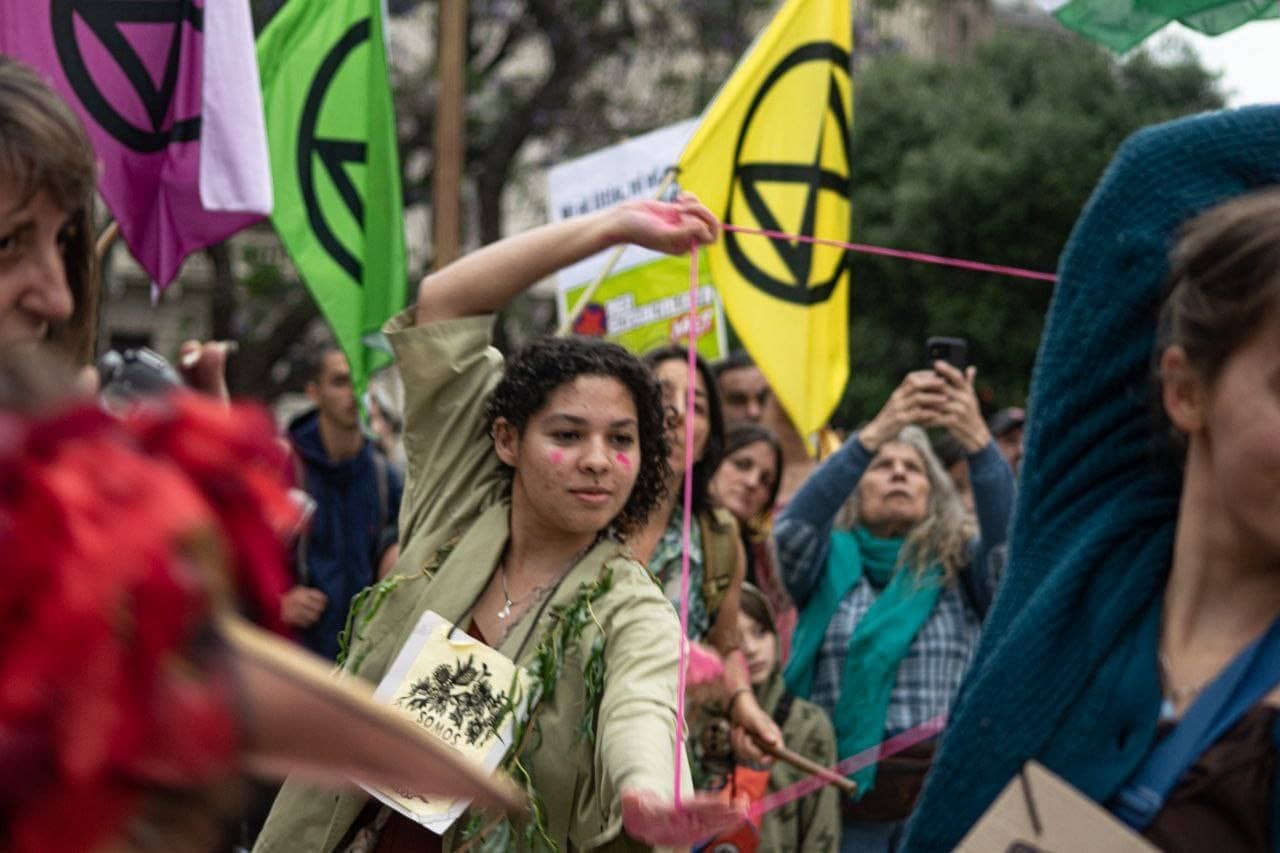 Rebels perform a special dance during a campaign against extractivism in Argentina.
Rebels perform a special dance during a campaign against extractivism in Argentina.
In Action Highlights we report on a nationwide campaign against extractivism in Argentina, where courageous rebels are continuing to protest despite threats from an authoritarian new president. We also investigate a gross overreaction by the Italian state, with rebels being banished for years from Venice for (harmlessly) turning one of its rivers green.
For a New Year boost, our Special Report picks out six victories from 2023 that prove peaceful protest works. Each entry is a precious jewel to savour, and should put a spring in your step as you march the streets this year.
 Climate Defiance ruins an honorary dinner for the CEO of ExxonMobil. In 2023, the new group terrified Washington and met with the White House. Victory!
Climate Defiance ruins an honorary dinner for the CEO of ExxonMobil. In 2023, the new group terrified Washington and met with the White House. Victory!
Finally, in Humans of XR, we speak to an inspiring rebel living in Sri Lanka who is both a climate and a human rights activist after witnessing terrible crimes during the mass protests of 2022 that swept away the government.
The newsletter team wishes all rebels a very happy and hopeful 2024, and looks forward to reporting on another year of courageous actions and precious victories.
This newsletter is brought to you by XR Global Support, a worldwide network of rebels who help our movement grow. We need money to continue this crucial work.
Contents
-
Action Highlights: Argentina Against Extractivism, Green Rivers of Italy
-
Action Round Up: Serbia, Spain, Netherlands, Australia, UK, UAE, Norway, Uganda, Belgium, South Africa, USA, France
-
Special Report: Six Inspiring Victories From 2023
-
Book of the Month: Regeneration by Paul Hawken
-
Humans of XR: Melani, Sri Lanka
-
Announcements: Insure Our Future, Campus Climate Network
Action Highlights
Uncertain Future for XR Argentina
4 DEC | Nationwide, Argentina
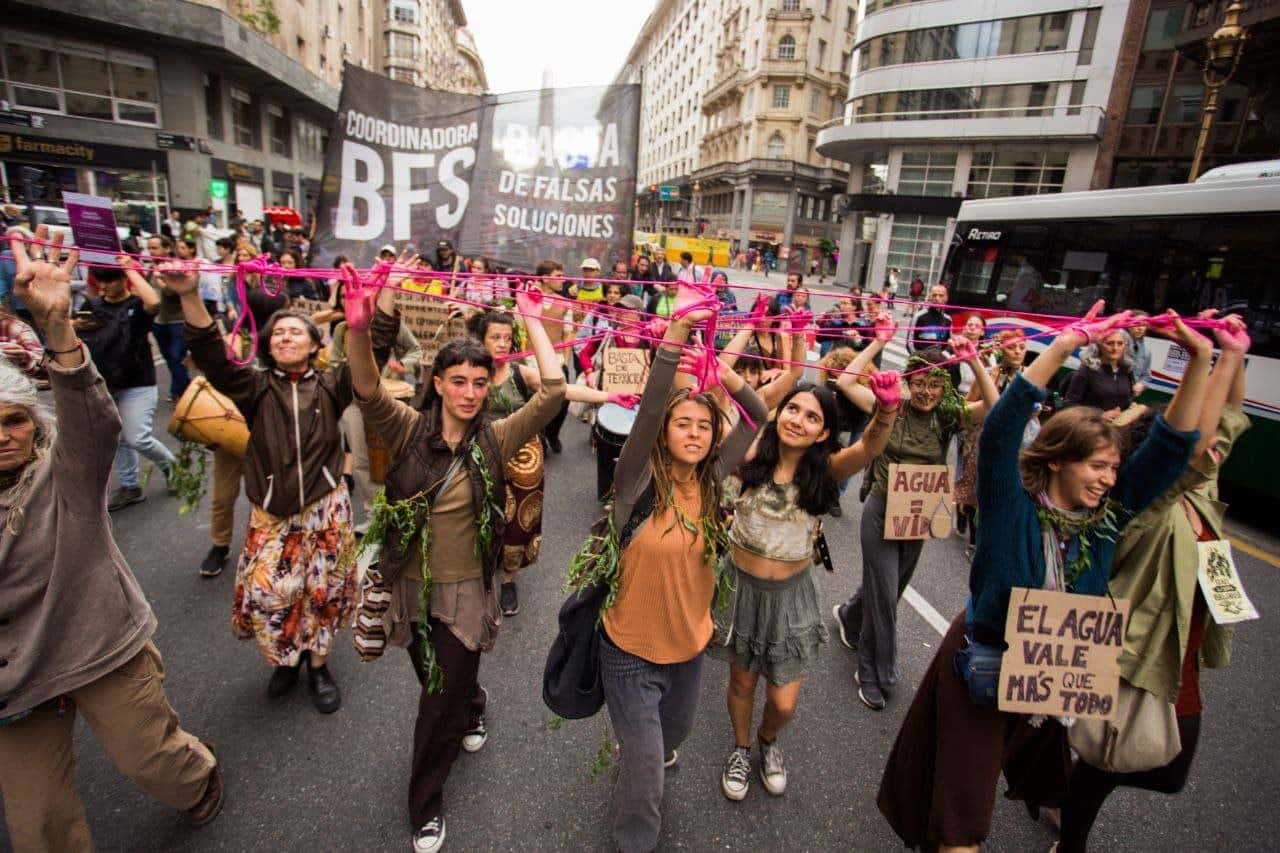 Rebels perform a group dance while marching through Buenos Aires.
Rebels perform a group dance while marching through Buenos Aires.
Since the large-scale Atlanticazo protests we covered a few months ago, the streets of Argentina haven’t gone quiet. December saw the launch of a huge campaign by more than 128 assemblies, organisations and indigenous communities to oppose extractivist governments all over the world.
XR Argentina was a key part of the coalition, with 10 regional groups bringing banners, drums, and actions to marches across the country. In Buenos Aires, rebels performed an intricate group dance while tethered together by threads, mirroring the mycorrhizal networks that bind fungus to plants and nourish entire ecosystems.
The campaign followed the election of a new Argentine president, who stood on a platform of populist and ultra-neoliberal policies. He quickly issued a decree that scraps or weakens over 350 laws, and XR Argentina released a detailed statement warning of the terrible ecological damage it will cause.
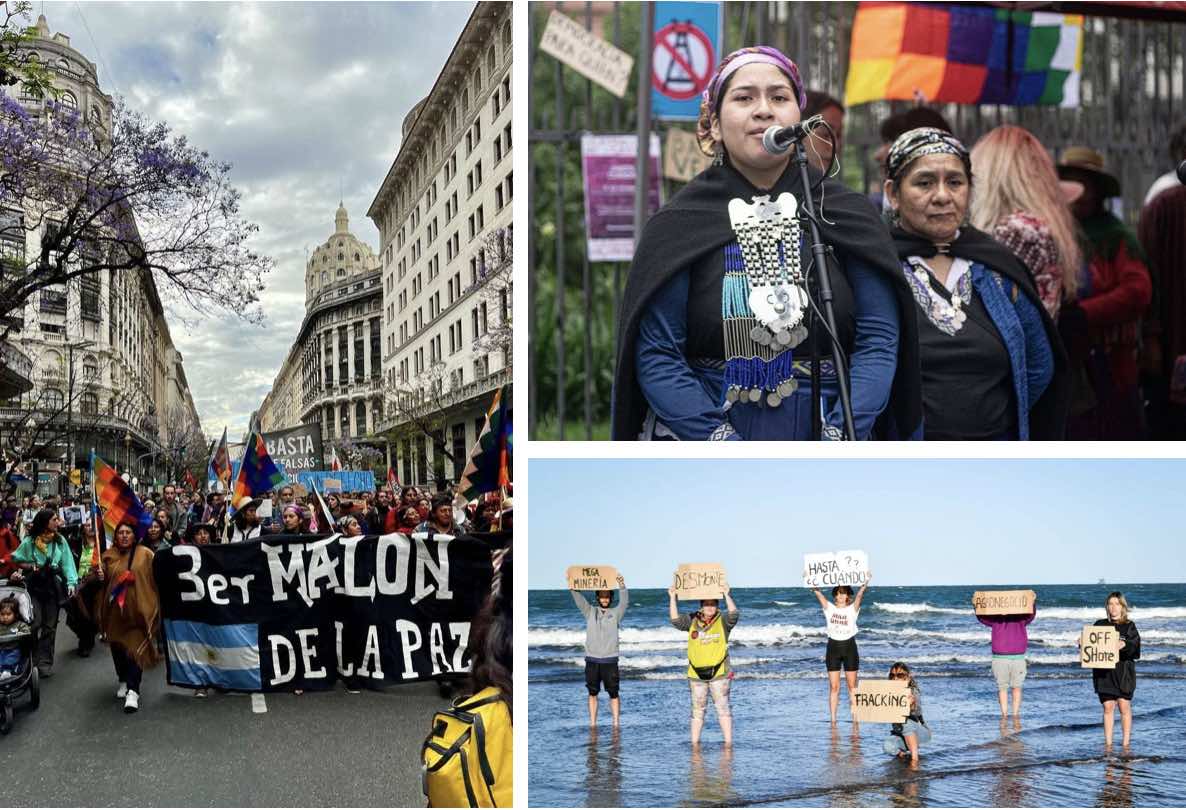 A delegation from Jujuy join the march in Buenos Aires (left), a Mapuche woman talks about the suffering caused by extractivism in Patagonia (top right), and rebels protest beside the Argentine Sea, which is earmarked for offshore oil drilling.
A delegation from Jujuy join the march in Buenos Aires (left), a Mapuche woman talks about the suffering caused by extractivism in Patagonia (top right), and rebels protest beside the Argentine Sea, which is earmarked for offshore oil drilling.
The decree will enable a surge in rural land sales to foreign companies, reduce oversight of mining companies, and weaken indigenous land rights. Worse, the new government has followed the decree with an authoritarian crackdown on free speech and protest. Activists face being stripped of state benefits and billed for police deployment.
XR Argentina stresses that all these repressive changes are unconstitutional, and rebel groups are discussing how to navigate the new legal landscape and continue public protest. Right now, the future for rebels in Argentina is full of uncertainty.
Follow XR Argentina on Instagram.
The Green Mafia?
9 DEC | Rome Venice Milan Turin Bologna Bari, Italy
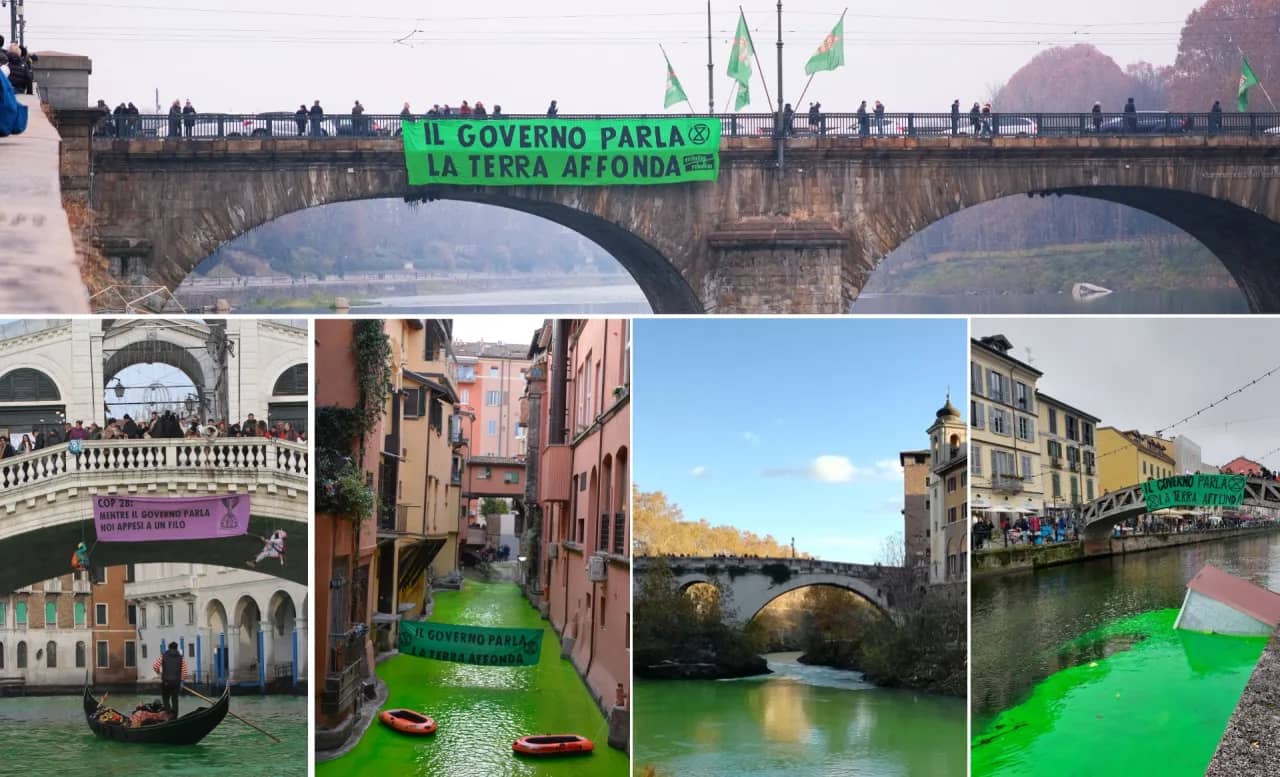 Rivers turn green to denounce the failure of COP28. Banners: The government speaks, the earth sinks.
Rivers turn green to denounce the failure of COP28. Banners: The government speaks, the earth sinks.
In a disturbing trend that has become the new normal in Italy, peaceful eco-activists are being branded a “danger to security and public order”, banned from cities without trial, and criminalised under anti-terrorist laws intended to prosecute the mafia.
Here’s what the Italian government considers so dangerous: In a coordinated day of action, rebels turned the rivers of six cities green with a harmless dye to denounce the inaction of COP28, and used climbing gear to suspend themselves from bridges to show how life is hanging by a thread.
Papier-mâché houses were displayed sinking into the waters, while rebels played music, made speeches, distributed leaflets, and engaged with curious pedestrians.
In Venice, 28 people were arrested, including a random tourist and members of the press. 27 charges and five city bans lasting 4-years were served, though the police were forced to revoke one expulsion order because it illegally banned a student from attending her university.
 A rebel plays her double bass under the Ponte di Rialto. She was arrested, and the instrument was confiscated by the police.
A rebel plays her double bass under the Ponte di Rialto. She was arrested, and the instrument was confiscated by the police.
The police overreaction caused a public outcry. Fifty teachers from Ca' Foscari University wrote an open letter calling the response an "intimidating and unhealthy act for a democratic society". In Torino, a petition signed by 2500 people, including many professors, asked the government "to guarantee maximum freedom of demonstration and to avoid the criminalisation of dissent".
But the Venetian police refused to see sense. Two weeks later, everyone identified with the Grand Canal action was summoned for an "oral warning”, a prelude to special state surveillance usually reserved for members of the mafia. And two more city bans were served days later, also based on illegitimate legal grounds.
The Italian government is trying to construct a narrative that defines those who join climate movements as eco-terrorists and criminals. Italian rebels, meanwhile, will keep telling the truth.
Follow XR Italy by visiting their website.
Action Round Up
 25 NOVEMBER | Belgrade, Serbia: XR Serbia played a football match against Capitalism FC in front of the Serbian parliament during COP28. Ecocidal corporations like Rio Tinto want to dig up Serbia’s rich mineral deposits, and the politicians are happy to oblige. Weeks later, rebels joined a series of huge blockades in the capital after the government was accused of stealing a December election. Police used tear gas and violence to clear the protests.
25 NOVEMBER | Belgrade, Serbia: XR Serbia played a football match against Capitalism FC in front of the Serbian parliament during COP28. Ecocidal corporations like Rio Tinto want to dig up Serbia’s rich mineral deposits, and the politicians are happy to oblige. Weeks later, rebels joined a series of huge blockades in the capital after the government was accused of stealing a December election. Police used tear gas and violence to clear the protests.
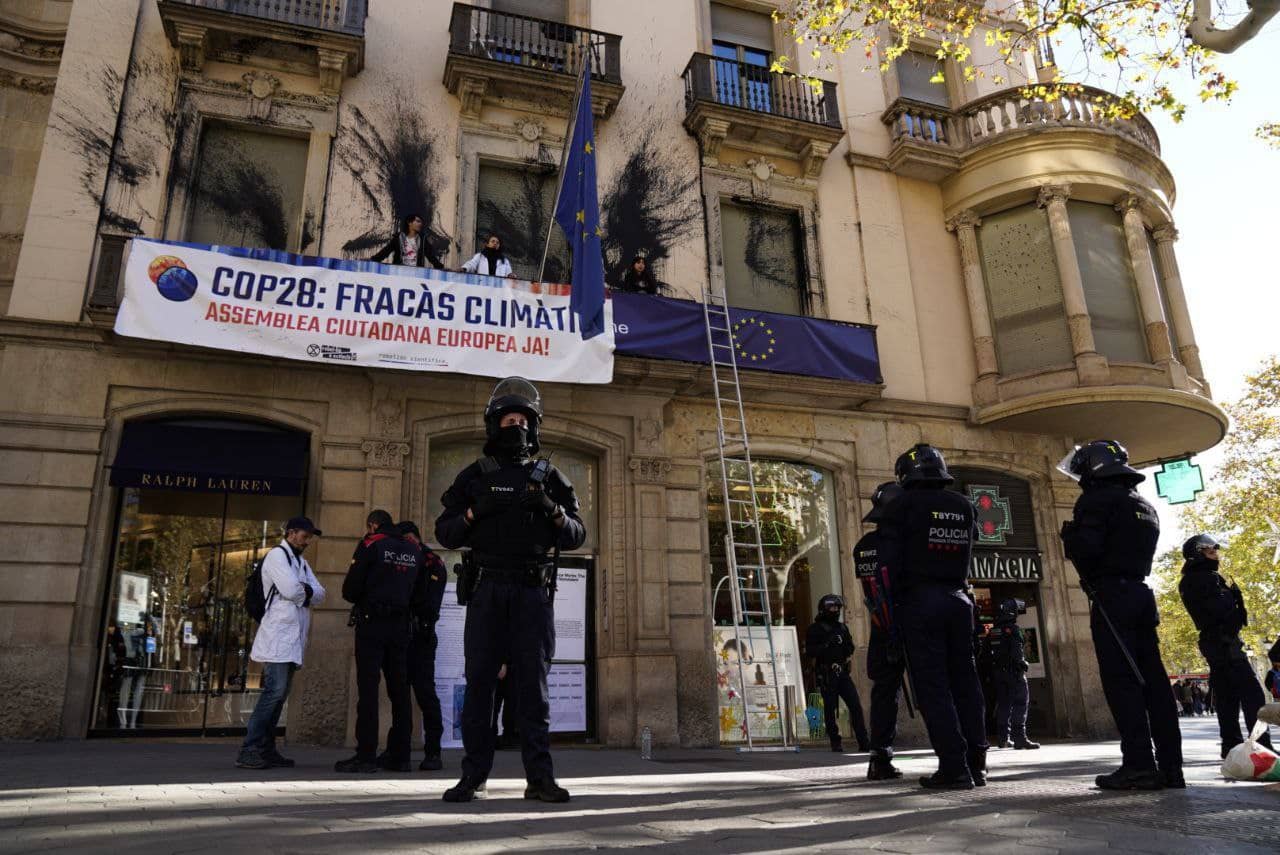 2 DECEMBER | Barcelona, Spain: Rebels occupy the Barcelona European Parliament office to denounce COP and demand a European Citizens' Assembly. They sprayed the building with black paint, dropped a banner, and chained themselves to the balcony, while others blocked the road outside.
2 DECEMBER | Barcelona, Spain: Rebels occupy the Barcelona European Parliament office to denounce COP and demand a European Citizens' Assembly. They sprayed the building with black paint, dropped a banner, and chained themselves to the balcony, while others blocked the road outside.
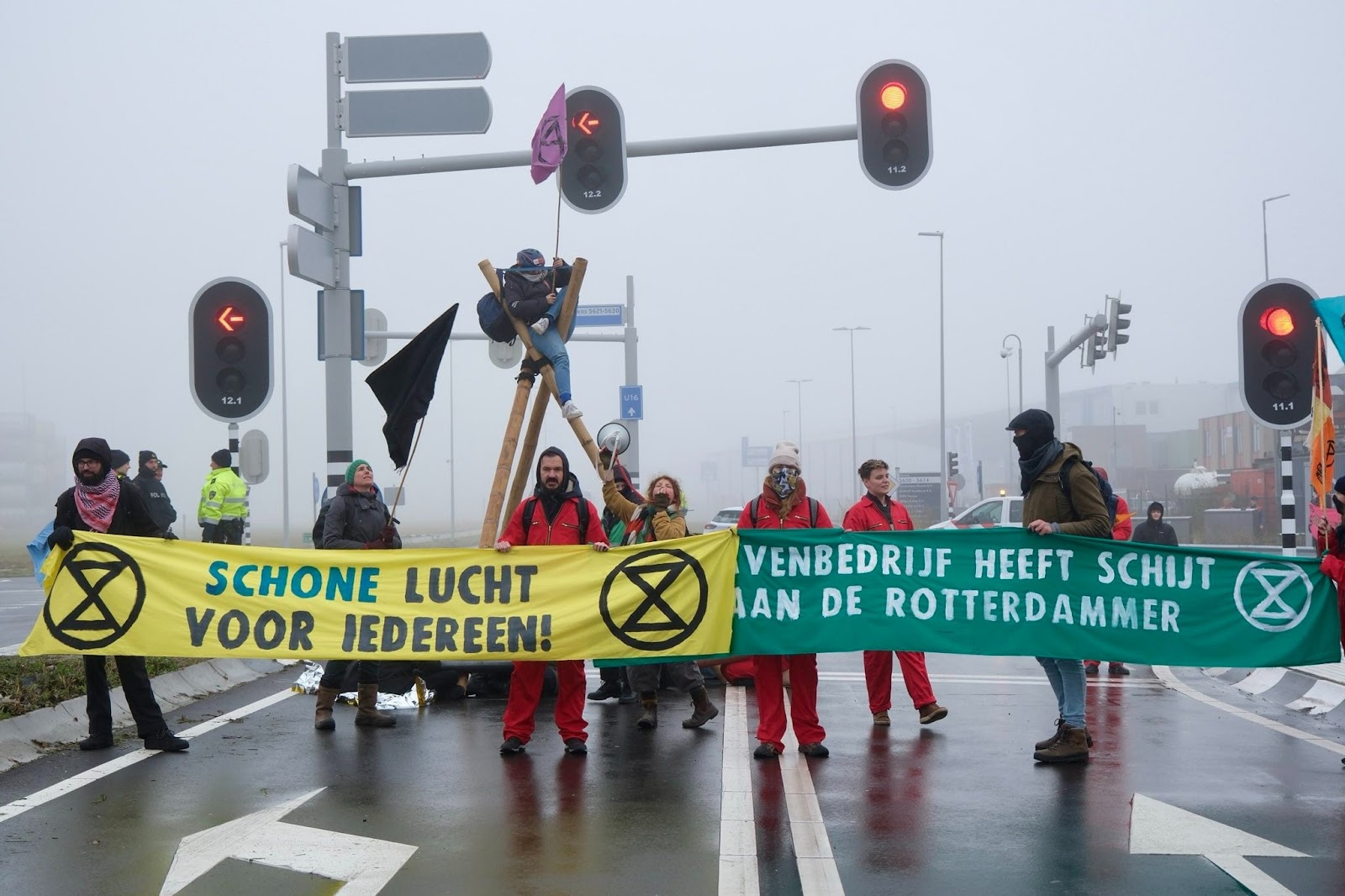 8 DEC | Rotterdam, Netherlands: 130 rebels block the main access roads to the Europoort, the most polluting port in Europe. After hours of disruption, the Mayor of Rotterdam invited XR for talks about making the port more sustainable. During the meeting, the Mayor acknowledged the port had a major pollution problem and a green transition was necessary, but promised only to discuss the matter further with the company running the port.
8 DEC | Rotterdam, Netherlands: 130 rebels block the main access roads to the Europoort, the most polluting port in Europe. After hours of disruption, the Mayor of Rotterdam invited XR for talks about making the port more sustainable. During the meeting, the Mayor acknowledged the port had a major pollution problem and a green transition was necessary, but promised only to discuss the matter further with the company running the port.
 5–10 DEC | Melbourne, Australia: The December Rebellion disrupts city traffic for four days, culminating in a massive slow march and sit-down that saw 75 arrests. Indigenous groups, Red Rebels, and Blinky the giant burning koala, joined hundreds on the streets to resist seismic blasting, fossil fuels, and the global war machine. Photo: Ari Hatzis
5–10 DEC | Melbourne, Australia: The December Rebellion disrupts city traffic for four days, culminating in a massive slow march and sit-down that saw 75 arrests. Indigenous groups, Red Rebels, and Blinky the giant burning koala, joined hundreds on the streets to resist seismic blasting, fossil fuels, and the global war machine. Photo: Ari Hatzis

 9 DEC | Global: Rebels join hundreds of protests across 40 countries, including the UK (top) and COP28 host, UAE (bottom) to mark a Global Day of Action for Climate Justice and demand a ceasefire in Gaza, highlighting how the climate crisis and genocidal violence are both results of the same unjust global systems.
9 DEC | Global: Rebels join hundreds of protests across 40 countries, including the UK (top) and COP28 host, UAE (bottom) to mark a Global Day of Action for Climate Justice and demand a ceasefire in Gaza, highlighting how the climate crisis and genocidal violence are both results of the same unjust global systems.
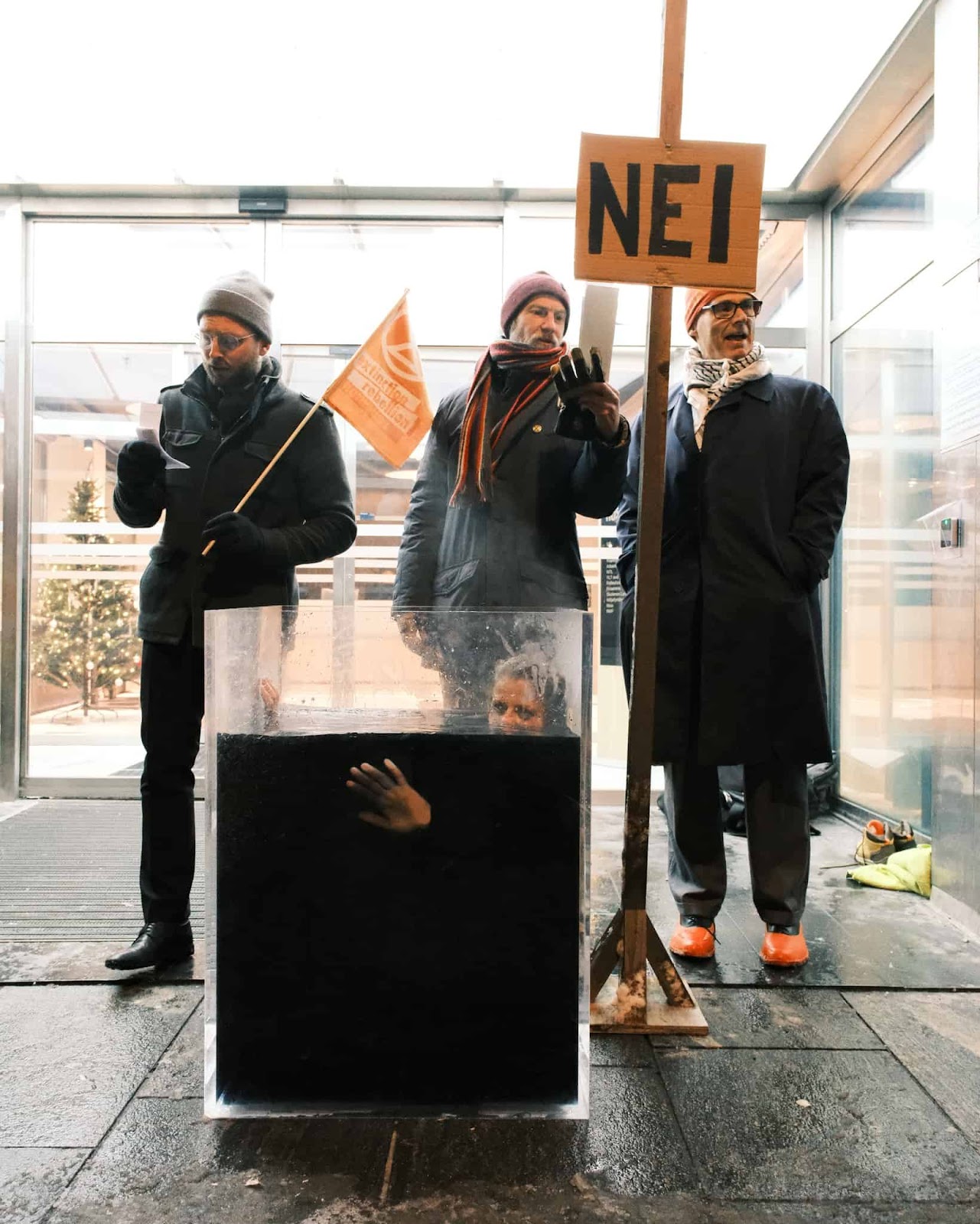 12 DEC | Oslo, Norway: Rebels shut down the headquarters of Norway’s largest trade union group for its support of the oil industry and failure to offer its workers jobs in a green transition. The blockade forced arriving union employees to face people “drowning” in oil and either support or reject further oil exploration. The government recently banned deforestation, though is still happy for its oil industry to commit ecocide beyond its own boundaries.
12 DEC | Oslo, Norway: Rebels shut down the headquarters of Norway’s largest trade union group for its support of the oil industry and failure to offer its workers jobs in a green transition. The blockade forced arriving union employees to face people “drowning” in oil and either support or reject further oil exploration. The government recently banned deforestation, though is still happy for its oil industry to commit ecocide beyond its own boundaries.
 15 DEC | Kampala, Uganda: Four more student activists are violently arrested during a protest outside the Ugandan parliament. As well as demanding an end to EACOP, they demanded the release of seven student activists imprisoned earlier in November. The seven students were released a few days later and accused the prison of torture. The four newly incarcerated students will not be up for release until the 10th January.
15 DEC | Kampala, Uganda: Four more student activists are violently arrested during a protest outside the Ugandan parliament. As well as demanding an end to EACOP, they demanded the release of seven student activists imprisoned earlier in November. The seven students were released a few days later and accused the prison of torture. The four newly incarcerated students will not be up for release until the 10th January.
 16 DEC | Liège & Antwerp, Belgium: Code Rouge/Rood activists from across Europe disrupted Liège Airport and Antwerp Airport to demand degrowth of the aviation industry and an end to private jets. Police used batons and pepper spray to violently arrest hundreds of protesters as they headed to Antwerp Airport, though some still managed to access the runway and block all private jet traffic. But the police weren’t ready for a second target! 600 activists entered Liège Airport, Europe’s fastest growing cargo airport and the main EU hub for e-commerce giant, Alibaba.
16 DEC | Liège & Antwerp, Belgium: Code Rouge/Rood activists from across Europe disrupted Liège Airport and Antwerp Airport to demand degrowth of the aviation industry and an end to private jets. Police used batons and pepper spray to violently arrest hundreds of protesters as they headed to Antwerp Airport, though some still managed to access the runway and block all private jet traffic. But the police weren’t ready for a second target! 600 activists entered Liège Airport, Europe’s fastest growing cargo airport and the main EU hub for e-commerce giant, Alibaba.
 17–18 DEC | Cape Town, South Africa: Rebel paddlers take to the sea to resist the arrival of a seismic blasting ship from Australia. The ship will blast continuous sound pulses for four months to find fossil fuels under the seabed, killing marine life as it does so. The paddle protest followed a beach rally earlier in the month.
17–18 DEC | Cape Town, South Africa: Rebel paddlers take to the sea to resist the arrival of a seismic blasting ship from Australia. The ship will blast continuous sound pulses for four months to find fossil fuels under the seabed, killing marine life as it does so. The paddle protest followed a beach rally earlier in the month.
 18 DEC | Seattle, USA: XR Seattle blockades an Amazon warehouse to protest the colossal damage the corporation is doing to ecosystems and communities around the world. Rebels demanded accountability and drastic reform as five protesters locked on beside a crowd of supporters. The action was originally meant to happen on Black Friday, but was postponed when details were leaked to the police.
18 DEC | Seattle, USA: XR Seattle blockades an Amazon warehouse to protest the colossal damage the corporation is doing to ecosystems and communities around the world. Rebels demanded accountability and drastic reform as five protesters locked on beside a crowd of supporters. The action was originally meant to happen on Black Friday, but was postponed when details were leaked to the police.
Special Report
Six Inspiring Victories From 2023
 Victories in 2023 in (top) the Netherlands, Panama, France (bottom) DRC, UK, USA.
Victories in 2023 in (top) the Netherlands, Panama, France (bottom) DRC, UK, USA.
As we gear up for another year of protest, we could probably all do with a bit more hope. So here are six victories from 2023 that prove peaceful protest is the answer, and can keep us buzzing on the streets...
1. XR Netherlands Changed Politics
Rebels in the Netherlands are stubborn. They wanted fossil fuel subsidies abolished, and promised to blockade the A12 motorway until their government complied. The blockades got bigger and bolder, and in October, after 27 days of disruption and an incredible 9,000 arrests, the Dutch Parliament gave in, tabling new laws to end fossil fuel subsidies. Since then, the Senate has rejected the laws and the government has lost power, so the A12 blockades will soon return. But this episode shows that rebels can make parliaments dance to their tune if they are stubborn enough.
2. The People of Panama Ended Extractivism
The people of Panama won an almighty battle against the mining industry in November. A Canadian corporation had let its giant copper mine poison the region for a decade, and when the government renewed its contract, thousands rose up. Protesters were blinded by police and shot by crazed motorists, but the street blockades grew bigger, and within weeks the supreme court ruled the contract illegal, and the mine was closed. Billions of dollars are at stake, and legal battles loom, but the protesters are going nowhere and plan to occupy the mine. Together with the Jujuby rebellion in Argentina and the oil drilling referendum in Ecuador, South America showed us all last year just how powerful people power can be.
3. The French Government Failed to Ban a Protest Group
In April, we reported on how Earth Uprising (Les Soulèvements de la Terre) were disrupting infrastructure designed to privatise water in drought-ridden rural France. Their protest attracted 30,000 people, as well as incredible violence from the police. Undeterred, Earth Uprising mobilised against more ecocidal infrastructure, and by June the French government had used anti-terrorism legislation to outlaw the group and arrest its organisers. The movement held firm, and challenged the decision in the courts. In November, France’s supreme court overruled the government. The group is now planning a huge mobilisation during the Paris Olympics this summer.
4. XR DRC Spread Loving Rage Along The Fossil Fuel Frontline
XR Goma University has been touring the DRC to raise grassroots resistance against oil drilling in the country. Its ‘Petrole Non Merci’ campaign has seen new XR chapters pop up in areas earmarked for oil exploitation, as well as in Moanda, an impoverished region that has been devastated by oil drilling since the 1960s. Rebels have travelled thousands of miles to empower communities on the doorstep of the oil industry, and shown just how effective and global our movement can be.
5. XR UK Closed a Coal Mine
Locals had been fighting for years to get it shut down. The local council had ordered it to close a year earlier. Yet somehow the last and largest opencast coal mine in the UK was still going. But then in July, XR UK’s iconic pink boat sailed up to the mine’s entrance and into the news headlines. Rebels shut down the mine for the day, and joined a coalition of activists to march around it. By November, it was closed for good, though the mine’s owner is yet to start a promised clean-up of the area.
6. Climate Defiance Hounded Washington
In March, a brand new, youth-led, collective gate-crashed a speech by a White House climate advisor and shut it down. A few weeks later, they did it again. And again. This year, they’ve stalked the galas, fundraisers, and book launches of the fossil-friendly political elite in Washington, and ruined every single event in style. But it was their delicious infiltration of a dinner honouring the CEO of ExxonMobil that helped the group hit the stratosphere, gaining them an audience of millions, and a private meeting with the White House. Climate Defiance are young, angry, and very savvy, and we can’t wait to see what 2024 brings. Hopefully more shit for Darren.
Book of the Month
Regeneration: Ending the Climate Crisis in One Generation, by Paul Hawken
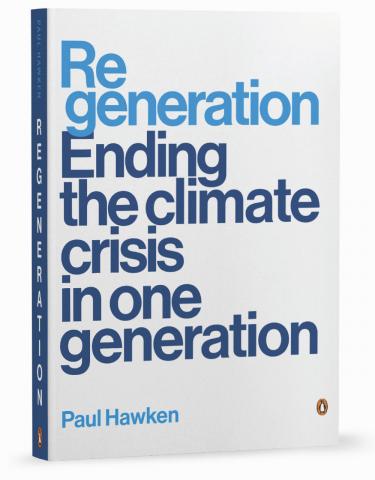
Paul Hawken's idea is simple: anything that supports living systems in accumulating carbon is likely to address climate change AND carry other great benefits, from biodiversity enhancement to economic prosperity. This book is an accessible but thorough exploration of what kinds of projects provide that support and why. Anyone engaged in resource management, community organisation, or infrastructure design can use Hawken's book to figure out how to be part of the solution.
Remember that “resource management” can include your own garden. Paul Hawken does not try to claim that any small effort can save the whole world, but his advice does apply to both large and small scales—and he provides plenty of examples of seemingly powerless people who found ways to make a surprisingly big difference.
Regeneration is a book of principles, not procedures—a valid and useful approach to advice-giving, but it could surprise readers, and some might also wish the book had a reference section. But in a world where most authors seem focused on climate solutions that are either too big for most people to implement or too small to really matter, Paul Hawken threads the needle and offers some truly useful advice.
Avoid Amazon. Support local bookshops. Buy your books at Bookshop or Hive.
Humans of XR
Melani, Sri Lanka
 Melani is arrested during a protest by the Socialist Youth Union. Photo: Tharaka Basnayaka @tharaka_
Melani is arrested during a protest by the Socialist Youth Union. Photo: Tharaka Basnayaka @tharaka_
Ten years ago, I started working at a farmer’s market in Colombo, which was also a social enterprise that prioritises people and planet over profit. I had always been concerned about the climate crisis, and working there inspired me to turn this concern into action.
The first protest I organised was in 2019 as part of global climate strike by Fridays for Future. My friends and I made posters, went to a local park, and asked people to join us. Then I joined XR Sri Lanka. Initially, we organised actions such as tree planting and trash audits because disruptive protesting in Sri Lanka was very unsafe.
In 2022, mass protests against the government broke out across the country, which became known as Aragalaya (The Struggle). I joined with a few friends in a tent, and after nearly four months of protesting, the presidential and prime ministerial residences were occupied by the people. During these protests, something happened which drew me to human rights activism, as well as climate activism.
While we had been targeted with tear gas and water cannons by the police before, and even got arrested, I had never felt thoroughly unsafe. But on coming home after spending days at the protest site, we heard that the military had surrounded it. Our friends were still there, and we quickly returned, only to be met by a wall of soldiers.
A member of the military grabbed my phone and started to delete footage I had taken of the protests. When my friend stood up for me, they grabbed him, hit him in his face and dragged him off.
It was terrifying; we didn’t know where he was for over three hours. He was beaten by the police for the entirety of this time. To this day, he does not dare to file a complaint with the Human Rights Commission because the military threatened to come for his family.
Since then, I have been involved in several causes, and I raise awareness about the intersection between climate change and human rights violations. I now understand that lack of accountability for human rights violations also leads to no accountability for environmental and economic crimes.
There is this narrative pushed by governments and the private sector that tackling climate change is a privileged endeavour, and that living standards have to go down for emissions to go down. In Sri Lanka, we have seen time and time again that this is not true, and that it takes tremendous risk and courage to speak out for the truth.
If you know (or are) a rebel somewhere in the world with a story to tell, get in touch at [email protected]
Announcements
Insure Our Future: Global Week of Action
26 FEB–3 MAR | Global

The Insure Our Future network is gearing up for its first Global Week of Action from Feb 26 to March 3, targeting the insurance industry for their role in the climate crisis.
Insurance is the Achilles heel of the fossil fuel industry. Without insurance, most new projects can’t go ahead, and existing ones must close. Insurers are facilitating ecocidal projects like EACOP, methane gas in the US, and oil drilling in the Arctic and North Sea. We’re calling them out, but we need your help!
Learn more and sign up. (Based in the UK? Wait for details of XR UK’s Mini-Rebellion, which will be connected to this campaign.)
Campus Climate Network: Faculty Search
Global
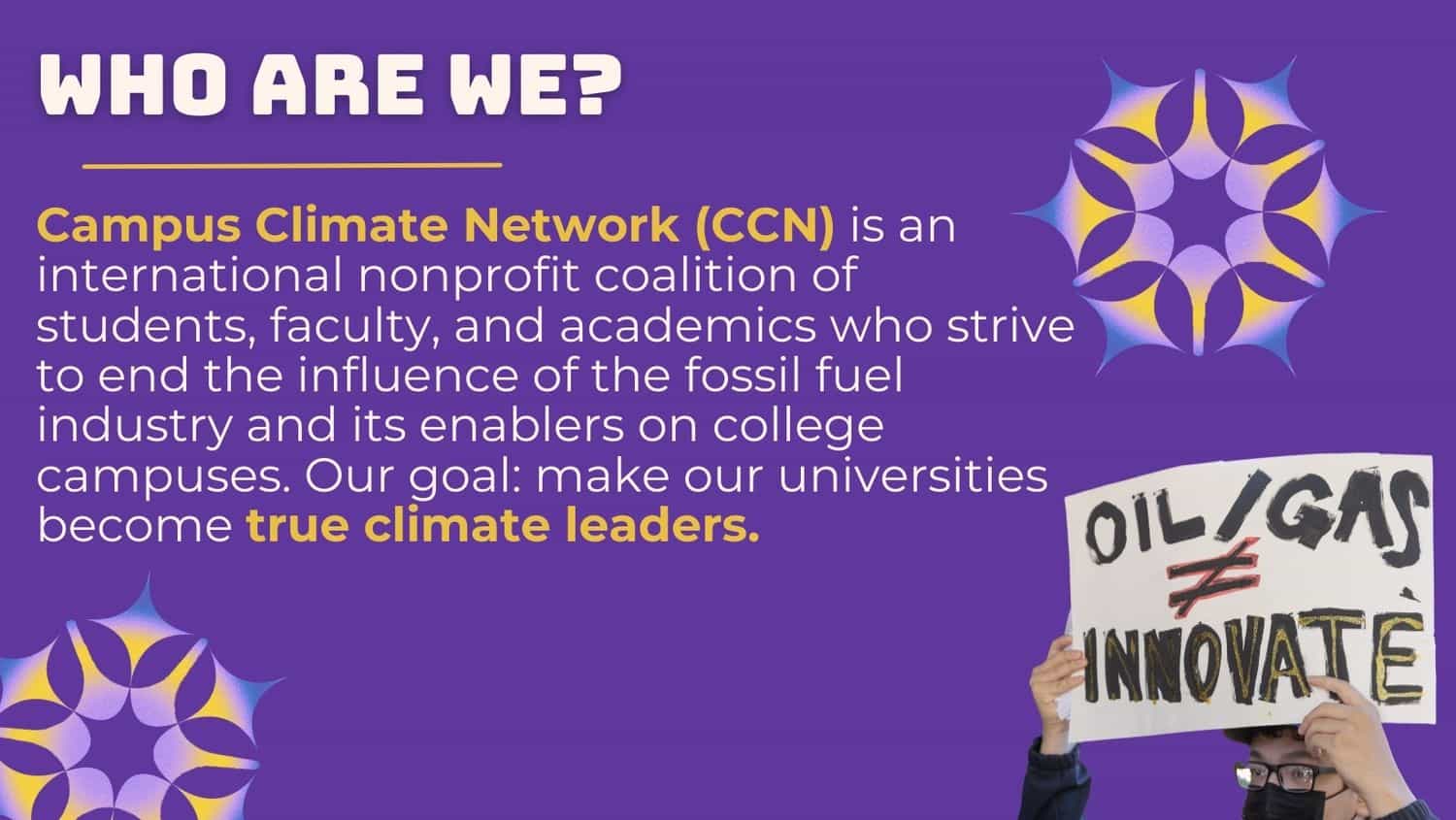
Campus Climate Network is assembling a working group for faculty members, with a focus on the role of faculty in supporting student-led campaigns to divest from fossil fuel financing and affiliations on campus. If this is something you'd like to be a part of, please fill out this faculty interest form.
If you are a university student who wants to find out more about Campus Climate Network, email Alicia Colomer: [email protected]
Register to be sent a link to our next coalition call.
Thank You
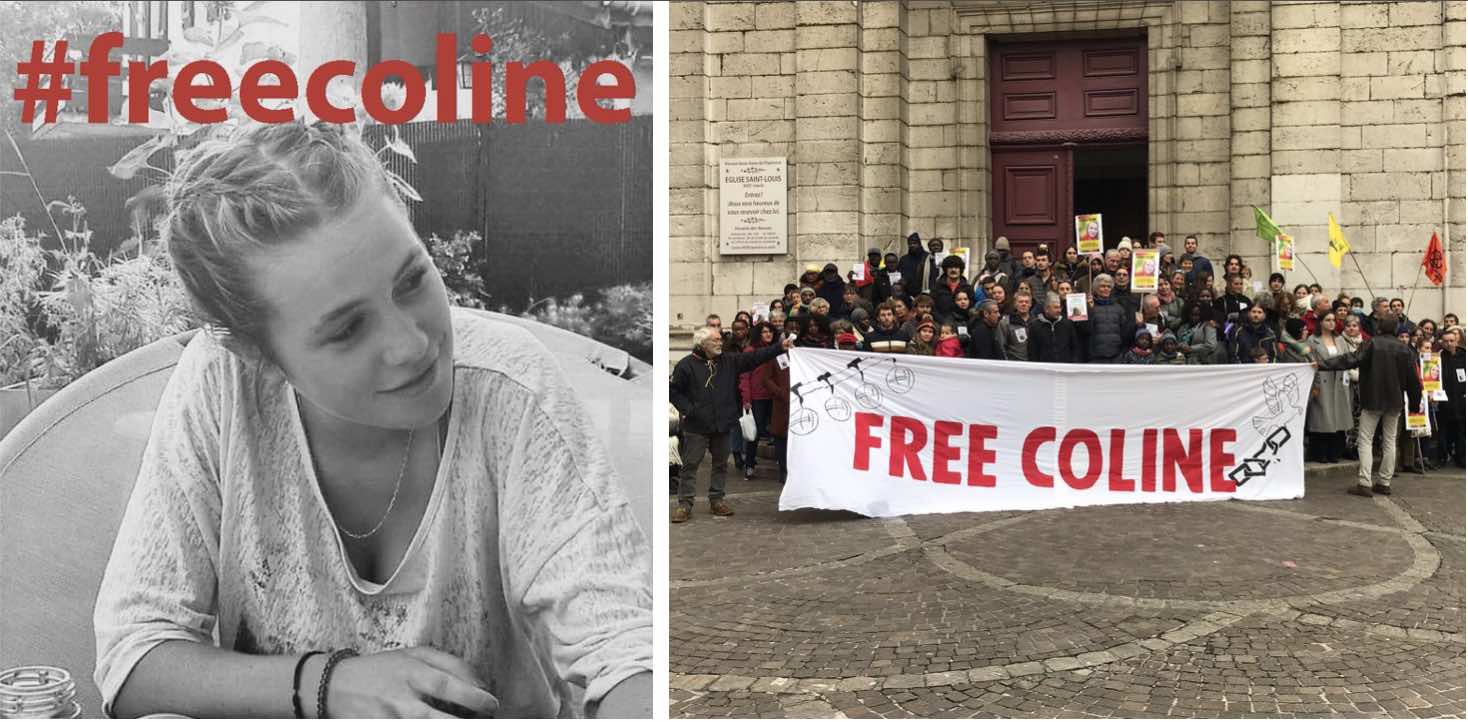 23 DEC | Grenoble, France: More than 100 people call for the release of a French rebel who was imprisoned in Senegal in November and faces a life sentence. Coline Fay was arrested for showing up at a courthouse to support an anti-corruption Senegalese presidential candidate. The French government is suppressing the story because it supports the current Senegalese president. Global protests are being planned. If you are interested in joining them, join this signal chat.
23 DEC | Grenoble, France: More than 100 people call for the release of a French rebel who was imprisoned in Senegal in November and faces a life sentence. Coline Fay was arrested for showing up at a courthouse to support an anti-corruption Senegalese presidential candidate. The French government is suppressing the story because it supports the current Senegalese president. Global protests are being planned. If you are interested in joining them, join this signal chat.
Thank you for reading, rebel. If you have any questions or feedback, we want to hear from you. Get in touch at [email protected].
Subscribe to the XR Global Newsletter.
Get involved in XR wherever you are! Check out our global website, learn more about our movement, and connect with rebels in your local area.
This newsletter is brought to you by XR Global Support, a worldwide network of rebels who help our movement grow. We need money to continue this crucial work.